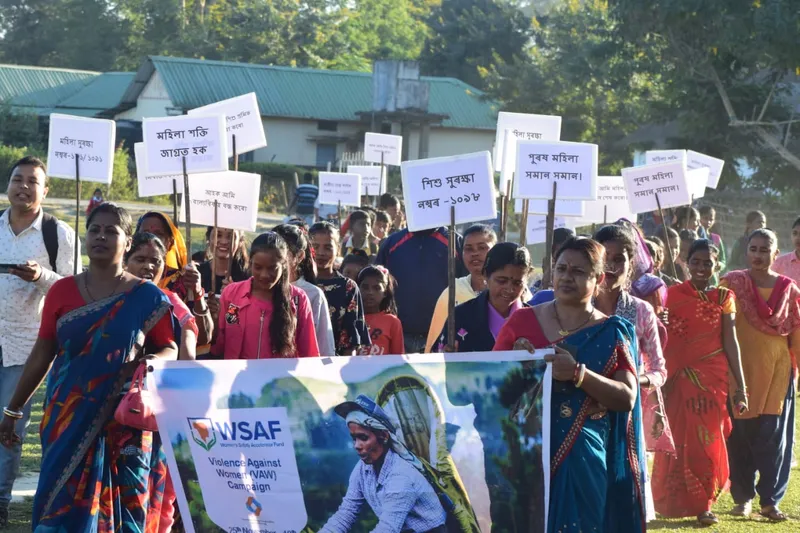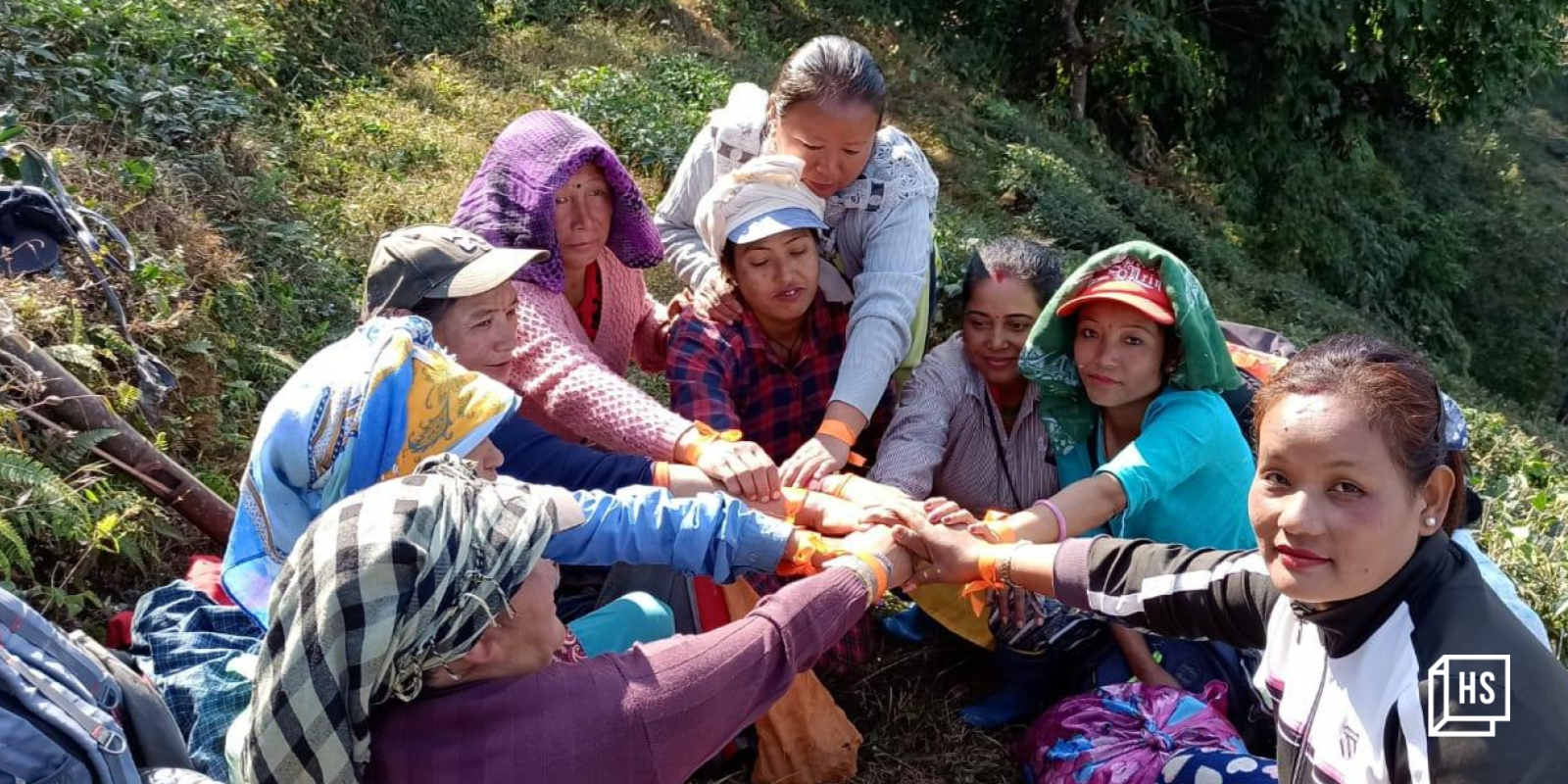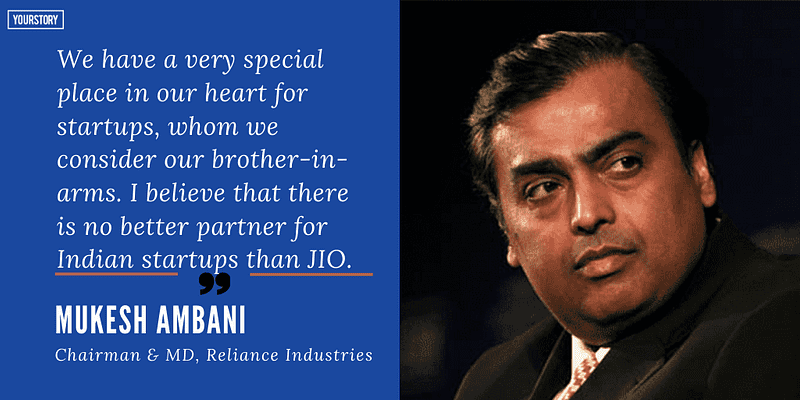Armed with awareness, women tea estate workers fight back against gender-based violence
WSAF, a programme by IDH, Ethical Tea Partnerships, Unilever, Tesco, Twinings, and Taylors, is empowering everyone–from tea estate management to local government and workers–to stop gender-based violence.
India is the second largest producer of tea in the world after China. Famous for its Assam and Darjeeling tea, the 200-year-old tea industry in the country is also one of the largest recruiters of women, who constitute almost 80% of tea pluckers. But despite dominating the industry, the women in the workforce are far from being empowered.
Two years ago, IDH—The Sustainable Trade Initiative, decided to take a closer look at the status of women tea plantation workers, and found that almost no plantation had a female manager or grievance officer.
“The Internal Committees (ICs) in most plantations were not formed as per the POSH (Protection of women from Sexual Harassment) Act guidelines,” Manisha Majumdar, Manager, Women’s Safety Accelerator Fund (WSAF) at IDH, tells HerStory.
However, today, more than 80% of the 350 tea gardens across Assam, West Bengal, Kerala, and Tamil Nadu, have a functioning IC with a woman president, she says.
This has been made possible by the WSAF, which was launched in 2021 as a gender-transformative programme in 29 tea estates across Assam. WSAF is a consortium of private actors that aims, to promote women’s safety and address violence against women and girls in the tea industry.
The programme, which is funded by IDH, Ethical Tea Partnerships, Unilever, Tesco, Twinings, and Taylors, is creating awareness about gender-based violence in tea value chains. The investors also engage and encourage their suppliers—tea estates and bought-leaf factories (BLFs)—to participate in the programme and consider adopting women’s safety measures and response mechanisms.
Need for WSAF
According to IDH, despite their indispensable role in tea production, women workers’ working conditions in tea gardens remain appalling.
For example, despite considerable improvement in maternal mortality rates in Assam’s tea estates, they are still among the highest in India. IDH’s research shows that different forms of gender-based discrimination and violence are evident in the high rates of child marriage, trafficking, and maternal mortality among the tea garden women workers in the state.
“We see that in the tea community, especially in Assam and West Bengal, women’s issues don’t find prominence due to the lack of representation,” says Majumdar. “Since most women and their families live around the plantations, it is a space where the line between workplace and residence is thin, and issues overlap.”
WSAF aims to connect the entire tea sector and its direct and indirect beneficiaries, including workers, producers, local government, regulators, investors, and the public towards safer working conditions for the woman workforce.

The implementing partners connect the tea garden communities with the management and resources such as one-stop centres, district legal services authority, health department, social welfare department, child protection officers, police, rural livelihood programmes and NGOs.
The tea estate typically includes an office and worker colonies set up in and around the property. Majumdar says owing to the remoteness of these locations and their insulated structure, workers are often disconnected from any external engagement, including local governance.
“Except perhaps the labour commission of the district and certification bodies that visit the plantations on and off, our baseline study showed that they had no knowledge of government provisions or redressal mechanisms, and this is a gap we wanted to fill,” says Majumdar.
The implementing partners have connected the tea garden communities with the management and resources such as one-stop centres, district legal services authority, health department, social welfare department, child protection officers, police, rural livelihood programmes, and NGOs.
They have also trained women in street plays to spread awareness within the community against gender-based violence, informed them about redressal processes such as which official to approach for specific issues, how to lodge complaints, etc., and put systems in place to make the whole process more streamlined.
Involving stakeholders
One of the biggest strengths of the programme is it works with various levels of the community—from the senior tea estate management, staff, and sub-staff, to men and women pluckers, and village samaj leaders.
Sunny Munda, the leader of a women’s pluckers group at Moukalbari Tea Estate in Kanai Gaon, Assam, says, for the women, gender- based violence doesn’t end with just eve teasing and harassment.
“It is about everything that prevents us from living a productive life. This includes domestic violence, financial insecurity, tedious working hours, verbal harassment by the management, and even child sexual abuse. All of this has been a part of the reality of women tea plantation workers,” she says.
“When our husbands take the money we make and spend it on alcohol, we have little to feed our children and send them to school. This affects our productivity too,” says Sunita Chavasi, another woman worker at the Mokalbari estate.
To make the process of grievance redressal simpler for heads like Munda, WSAF has set up gender cells in each estate comprising local women and mid-level staff at plantations who have been trained in capacity building to identify the day-to-day struggles of women workers and take them to resource persons at managerial and local government levels.
This also holds significance as the structure of the tea estate is different in different states.
For instance, in Assam, most workers live on the tea estate, while in Darjeeling, they live in independent villages that are part of the tea estates but outside their jurisdiction.
“But what is a constant is that every worker has to come back home to the village and this is where it becomes important to equip the samaj (community) leaders to become champions of change,” says Smita Bharti, Executive Director and President of Sakshi, a rights-based NGO in Delhi.
Sakshi became one of WSAF’s implementing partners last year, taking the programme to 64 tea gardens in West Bengal, Kerala, and Tamil Nadu. “We train the samaj leaders to understand the root causes of gender-based violence, and the misogyny and the sexism that drive it. We employ non-threatening measures such as conversations, workshops, role plays, songs, and performances,” she says.
Through such experiential learning, stakeholders at every level understand seemingly harmless acts of micro-aggression that result in gender-based violence and the ways to replace it with equality and respect. This also shifts the burden of shame on the survivor and gives the ownership to everyone involved in the system.
”WSAF is about equipping everyone involved to be aware of their rights, to unlearn harmful behaviours and to raise their voice against all forms of violence that have been normalised over the years,” says Bharti.
“So many of our women have gone through harassment at the workplace, but often, it would end up with a verbal warning by the manager. But the risk of retaliation or recurrence was always there,” says Munda. “But today, we see that our issues are instantly taken up by the management and also reach the concerned authorities who can help us, as we now know who is responsible for what.”
“From a time when we thought this was a part of our lives, we have now come to understand that these day-to-day struggles can be resolved,” says Chavasi.
Edited by Kanishk Singh and Megha Reddy










